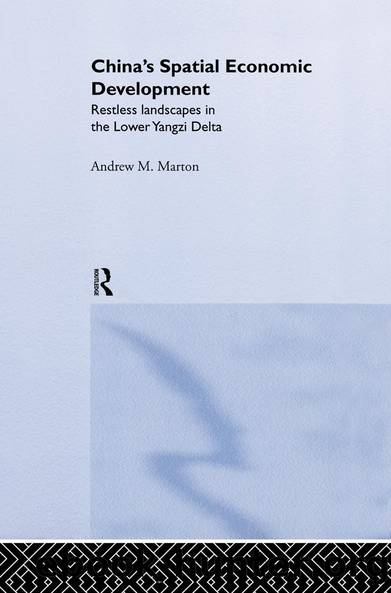China's Spatial Economic Development by Andrew M. Marton

Author:Andrew M. Marton [Marton, Andrew M.]
Language: eng
Format: epub
Tags: Business & Economics, Development, Economic Development, Political Science, Public Policy, Regional Planning
ISBN: 9780415227797
Google: yu86vgAACAAJ
Barnesnoble:
Goodreads: 5762403
Publisher: Routledge
Published: 2000-01-15T00:58:20+00:00
Plate 4.3 Restless landscapes. Chengbei and Xinzhen Towns, Kunshan.
Plate 4.4 Agricultural land protection zone. Shipai Town, Kunshan.
The multiple roles and interests of local governments also meant that issues of enterprise scale and location were often decided administratively for what might otherwise be seen as marginal investments. Numerous officials interviewed throughout the lower Yangzi delta, as well as in Kunshan, spoke passionately about local initiatives, particularly with respect to major infrastructural investments, despite obvious duplication or disarticulation with similar endeavours in neighbouring jurisdictions. When pressed to explain how such investments were considered economically viable, local officials referred to specific means by which they could guarantee the success of such initiatives. These included administrative decrees that forced enterprises within their jurisdiction to purchase locally produced goods, to utilize local services or infrastructure, and the implementation of various administrative barriers to âprotectâ these local investments from outside competition.45
The spatial economic implications of such intense localism were reflected in the emergence of what some have termed âpalace economiesâ, in which economic efficiencies were subordinated by administrative imperatives linked to areas of jurisdiction, authority and power.46 Taken together, these factors contributed to the downward dispersion of economic power away from the centre. Clearly, this trend was also prone to deep distortion and corruption within conditions I have elsewhere labelled âcapitalism with Chinese characteristicsâ.47 As a result, Kunshan was able to manage its economy as a discrete, autonomous entity and to strongly influence the way it related to the regional, national and global economies.
Download
This site does not store any files on its server. We only index and link to content provided by other sites. Please contact the content providers to delete copyright contents if any and email us, we'll remove relevant links or contents immediately.
Spell It Out by David Crystal(35861)
Life for Me Ain't Been No Crystal Stair by Susan Sheehan(35550)
Cecilia; Or, Memoirs of an Heiress — Volume 1 by Fanny Burney(32092)
Cecilia; Or, Memoirs of an Heiress — Volume 3 by Fanny Burney(31481)
Cecilia; Or, Memoirs of an Heiress — Volume 2 by Fanny Burney(31435)
The Great Music City by Andrea Baker(30930)
Professional Troublemaker by Luvvie Ajayi Jones(29445)
We're Going to Need More Wine by Gabrielle Union(18663)
Twilight of the Idols With the Antichrist and Ecce Homo by Friedrich Nietzsche(18324)
The Secret History by Donna Tartt(18267)
All the Missing Girls by Megan Miranda(14854)
Cat's cradle by Kurt Vonnegut(14804)
Pimp by Iceberg Slim(13828)
Bombshells: Glamour Girls of a Lifetime by Sullivan Steve(13718)
Fifty Shades Freed by E L James(12936)
Talking to Strangers by Malcolm Gladwell(12916)
Norse Mythology by Gaiman Neil(12879)
The Social Justice Warrior Handbook by Lisa De Pasquale(11969)
Underground: A Human History of the Worlds Beneath Our Feet by Will Hunt(11857)
